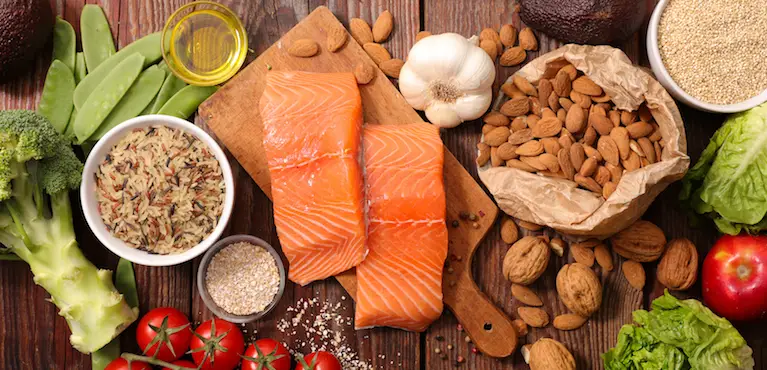Rheumatoid arthritis is one of the most common types of arthritis, its also one of the most crippling and painful forms of joint pain, usually leaving long-lasting consequences and deformation in the affected articulations. The diagnosis of rheumatoid arthritis requires both a physical exam and lab tests, and a rheumatologist should guide patients throughout the course of the disease. However, in addition to an appropriate therapeutic protocol, it is recommended to follow an anti-inflammatory diet that would further improve the symptoms.

Rheumatic diseases are those affecting your bones, muscles, articulations, and ligaments. However, they share a common feature: a dysfunction in the immune system and systemic inflammation. Thus, if we want to prevent flare-ups and the progression of the disease, everything we do should be careful not to stimulate an exaggerated response by the immune system and avoid triggering inflammation.
After reading this article, you will be able to understand inflammation in arthritis, how it relates to joint pain, and what type of foods you need to avoid to control your symptoms and prevent flare-ups. Find out about the 5 Stages of Rheumatoid Arthritis.
Inflammation is the link between diet and arthritis
In the case of rheumatoid arthritis, the immune system becomes overactive and starts targeting your body tissues the same way it defends against microbes or any other disease-causing agent. Rheumatoid arthritis usually affects the joint linings in a symmetric pattern, but it’s not limited to articulations and bones. Rheumatoid arthritis may also cause signs and symptoms in the skin, lungs, and the nervous system as well.
This ailment is more common and severe in women, and it usually starts in older age. However, rheumatoid arthritis is not exclusive for a given age, sex or race. It may affect anyone in any given stage of their life.
Rheumatoid arthritis is a chronic problem, which means it builds up over the passing years and may worsen its symptoms as the time goes by. It typically causes stiffness in the articulations, and deformation in the musculoskeletal system as the disease progresses. Treatment for rheumatoid arthritis usually comprises certain medications along with exercise and deep changes in the lifestyle, which include dietary modifications to adopt anti-inflammatory foods and avoid others that would potentially aggravate the symptoms.
Dietary cure for Rheumatoid Arthritis?
To fight the symptoms of rheumatoid arthritis through the diet, we should focus on including foods with anti-inflammatory potential and excluding those that would likely trigger inflammation and outbreaks of the disease. The Mediterranean diet, which is based on fruits, vegetables, nuts and seeds along with fish and olive oil, has been found beneficial for patients with rheumatoid arthritis.

We should focus on consuming a higher ratio of omega 3 compared to omega 6 fatty acids because the former has been linked to a reduction of the systemic inflammation. A healthy level of omega 3 can be found in fish, flaxseed, olive, and nuts, and we can also find them in various supplements in the market.
At the same time, we should avoid all saturated fats, especially if they come from animals, like meat and margarine. Trans-fat from fast food and processed foods are also detrimental for people with rheumatoid arthritis. They both increase the levels of C-reactive protein, an inflammatory marker in the body, and may increase the likelihood of having an outbreak of arthritis. Another component of the diet that has a profound effect on arthritis symptoms is sugar, which is the reason why we should avoid refined sugar and all sources of simple carbohydrates.
Thus, one of the approaches we can take is eliminating all of the foods in this list until the symptoms have been successfully controlled. Only afterward it will be possible to include those foods that are still considered healthy, such as dairy and red meat.
In the following sections, we will describe those foods you should include in your blacklist and the reason why each one of them is likely to trigger or aggravate joint pain in arthritis patients. However, keep in mind that every organism behaves differently, arthritis is a highly variable disease, and the potential triggers might be different from one patient to another.
These are the most important foods you need to avoid if you want to improve the symptoms of rheumatoid arthritis:
- White flour and white rice: White flour usually comes from wheat, and it is a highly refined product that contains gluten. Therefore, white flour has two components we should avoid if we are actively trying to control the symptoms of rheumatoid arthritis: gluten and simple carbohydrates. Gluten is a protein found in many different products in the market. It typically causes an immune response in the gut, known as celiac disease, and many studies suggest that eliminating gluten from the diet would also control the chronic inflammatory condition found in arthritis.
Research shows that a gluten-free diet has a positive effect on the symptoms of arthritis because it reduces the levels of food antigens, substances that trigger the immune response and may worsen the symptoms of chronic inflammation experienced by patients with rheumatoid arthritis. Additionally, white flour has been processed, and most of its carbohydrates have been changed into simple sugar, which also has added inflammatory potential.
Similarly, white rice and other refined foods are deprived of the germ and the bran, and the resulting carbohydrates are simple sugars that would increase the levels of insulin. Insulin peaks resulting from these foods result in an inflammatory potential we should avoid. It is recommended to take whole-wheat grain products and fresh foods instead of their refined and processed counterparts. - Confectionery and sweetened beverages: Processed sugar, confectionery, and everything containing high-fructose corn syrup is a potential cause of systemic disease, not only related to obesity and diabetes but also inflammatory processes like arthritis. According to studies, even low to moderate consumption of sugar-sweetened products may impair the glucose metabolism and promote a chronic inflammatory state in healthy people, measured by a blood marker called C-reactive protein. Patients with rheumatoid arthritis are especially susceptible to inflammation and should be extra careful around sugary foods and sweetened beverages, including carbonated drinks.
Excess sugar in the diet causes inflammation and aggravates rheumatoid arthritis symptoms in various ways. By promoting obesity, these foods increase the size and number of adipocytes, and these fat cells produce a series of inflammatory substances called cytokines. Thus, obese patients are in a constant state of low-grade inflammation, and they put extra mechanical strain over their joints and bones. Additionally, there’s a strong link between insulin resistance and systemic inflammation, and this would not only lead to worsening the symptoms of arthritis but may also trigger metabolic diseases as well. - Margarine and other sources of saturated fats and trans fats: The types of fat we consume influence the composition of our tissues and the levels of good and bad cholesterol in the blood (HDL and LDL cholesterol, respectively). In doing so, our diet also influences the metabolism of prostaglandins, which are substances that dictate how the immune system works and modulate inflammation.
There will always be prostaglandins and inflammatory markers in the body, and they are created with a backbone of fatty acids. However, the type of fat involved would dictate how the resulting substance will behave in the body. Prostaglandins created using unhealthy fats are more likely to activate inflammation that would further trigger the symptoms in rheumatoid arthritis.
Additionally, saturated fats go directly to the fatty tissue, and by increasing the percentage of fat, they also increase the levels of pro-inflammatory hormones synthesized and released by fat cells, also called adipocytes. - Red meat and meat products: The most important problem about meat and meat products is the type of fatty acids it contains. It has a huge amount of omega 6 fatty acids, which are not beneficial for your health. They are different from omega 3 fatty acids, which are a healthier version that typically reduces the levels of inflammation. In contrast, omega 6 increases the inflammation because it is the raw material to produce overactive cytokines and pro-inflammatory substances.
- Cheese and full-fat dairy products: Milk and dairy products are known to cause intolerance in certain patients, and they should be avoided by those who have been recently diagnosed with rheumatoid arthritis. During outbreaks, it is also very important to avoid whole milk and dairy products to be able to control the symptoms faster.
- Tomatoes: This is actually a common misconception. Naturally any excessive consumption of any fruit or vegetable could result in adverse effects. If you have Arthritis should you Avoid Tomatoes?
Studies show that milk and cheese cause an increase of IgE in the digestive system. IgE is an immunoglobulin, an antibody substance produced by plasma cells and capable of recognizing and attacking certain substances or tissues. Since rheumatoid arthritis is based on a dysfunction in the immune system, it is necessary to avoid all types of allergens, including milk and cheese. - Sodium glutamate: It is originally an amino acid found in many different types of foods, and serves as a neurotransmitter in the brain as well. Sodium glutamate would not be dangerous if consumed in low concentrations, but it started to be used as a natural preservative, also disguised as “hydrolyzed vegetable protein” or “E-621”.
Sodium glutamate is found in junk food and most processed foods, and cause an increase in the concentration of fibroblasts in the joints. Along with cytokines, which are inflammatory modulators, these cells destroy the cartilage and aggravates the symptoms of rheumatoid arthritis. As such, glutamate levels are increased in the synovial fluid of patients with rheumatoid arthritis, and we need to avoid this substance from the diet if we don’t want to cause any further damage to the joint tissue. - Coffee: Coffee is one of the most studied triggers of rheumatoid arthritis. This beverage is a mixture of many different chemical components, including caffeine. Caffeine in coffee may cause a disturbance in the cell cycle, changes the way cells react to repair their DNA and modulates the programmed cell death. It also increases the cardiovascular risk in heavy consumers, which poses an additional threat to patients with arthritis, who also suffer from cardiovascular problems.
- Citrus fruits: These fruits are essential to maintaining a healthy immune system because they are rich in vitamin C. However, they may aggravate the symptoms in some patients with arthritis, and the National Rheumatoid Arthritis Society recommends to avoid high-acid foods and citrus fruits. However, we need to highlight the fact that not every patient with arthritis has the same food triggers, and there is only anecdotal evidence and not enough research to systematically ban citrus fruits in all patients with arthritis.
Thus, it is recommended to avoid citrus fruits during the first stage of the disease and during flare-ups until the symptoms have improved, and after that it can be included in the diet moderately because its vitamin C content has been linked with improvements in rheumatoid arthritis. However, there are many other sources of vitamin C available for you if you realize you’re better off citrus fruits. You can have strawberries, broccoli, kiwi, and many others. - Processed foods and canned food: We have already covered sodium glutamate, but processed foods contain many other substances to increase shelf life, improve texture and taste. A good way to know whether or not foods are safe is to look at the label. If the ingredients you read are all recognizable and easy to pronounce, the product is likely to be safe. These ready-to-eat and packaged foods are usually filled with sugar, trans fat, and other substances linked to inflammation.
- Excess salt: More recent studies have also linked excess salt consumption and high sodium intake with an increased risk of rheumatoid arthritis. The mechanism of action is yet to be uncovered, but it is likely to be caused by an increase in the differentiation of a series of white cells called interleukin-17-producing helper T cell. When these cells are abundant, they start releasing an inflammatory substance that contributes to destroying the joint tissue and accelerates the progression of the disease.
Many patients have successfully improved their symptoms through an elimination diet and including anti-inflammatory foods such as olive oil, nuts, seeds, and other foods from the Mediterranean diet. When trying to control rheumatoid arthritis with dietary changes, we should be careful not to restrict important nutrients and provide healthy options when including certain foods to the blacklist.
For instance, instead of red meat we may increase the intake of fish products and other rich sources of protein. There are many additional sources of vitamin C if we choose to restrict the intake of citrus fruits. And instead of whole milk we can have skimmed milk and include extra sources of calcium such as beans, lentils, almonds, and leafy greens.
References:
Aeberli, I., Gerber, P. A., Hochuli, M., Kohler, S., Haile, S. R., Gouni-Berthold, I., … & Berneis, K. (2011). Low to moderate sugar-sweetened beverage consumption impairs glucose and lipid metabolism and promotes inflammation in healthy young men: a randomized controlled trial–. The American journal of clinical nutrition, 94(2), 479-485.
Firestein, G. S. (2003). Evolving concepts of rheumatoid arthritis. Nature, 423(6937), 356.
Hafström, I., Ringertz, B., Spångberg, A., Von Zweigbergk, L., Brannemark, S., Nylander, I., … & Klareskog, L. (2001). A vegan diet free of gluten improves the signs and symptoms of rheumatoid arthritis: the effects on arthritis correlate with a reduction in antibodies to food antigens. Rheumatology, 40(10), 1175-1179.
Hajati, A. K., Alstergren, P., Näsström, K., Bratt, J., & Kopp, S. (2009). Endogenous glutamate in association with inflammatory and hormonal factors modulates bone tissue resorption of the temporomandibular joint in patients with early rheumatoid arthritis. Journal of Oral and Maxillofacial Surgery, 67(9), 1895-1903.
Hinoi, E., & Yoneda, Y. (2011). Possible involvement of glutamatergic signaling machineries in pathophysiology of rheumatoid arthritis. Journal of pharmacological sciences, 116(3), 248-256.
Jeffery, L. E., Raza, K., & Hewison, M. (2016). Vitamin D in rheumatoid arthritis—towards clinical application. Nature Reviews Rheumatology, 12(4), 201.
Kremer, J., Michalek, A., Lininger, L., Huyck, C., Bigauoette, J., Timchalk, M., … & Bartholomew, L. (1985). Effects of manipulation of dietary fatty acids on clinical manifestations of rheumatoid arthritis. The Lancet, 325(8422), 184-187.
Lee, Y. H., Bae, S. C., & Song, G. G. (2014). Coffee or tea consumption and the risk of rheumatoid arthritis: a meta-analysis. Clinical rheumatology, 33(11), 1575-1583.
Linos, A., Kaklamani, V. G., Kaklamani, E., Koumantaki, Y., Giziaki, E., Papazoglou, S., & Mantzoros, C. S. (1999). Dietary factors in relation to rheumatoid arthritis: a role for olive oil and cooked vegetables?–. The American journal of clinical nutrition, 70(6), 1077-1082.
Min, S. Y., Yan, M., Kim, S. B., Ravikumar, S., Kwon, S. R., Vanarsa, K., … & Mohan, C. (2015). Green tea epigallocatechin-3-gallate suppresses autoimmune arthritis through indoleamine-2, 3-dioxygenase expressing dendritic cells and the nuclear factor, erythroid 2-like 2 antioxidant pathway. Journal of Inflammation, 12(1), 53.
Salgado, E., Bes-Rastrollo, M., de Irala, J., Carmona, L., & Gomez-Reino, J. J. (2015). High sodium intake is associated with self-reported rheumatoid arthritis: a cross sectional and case control analysis within the SUN cohort. Medicine, 94(37).
Shoelson, S. E., Lee, J., & Goldfine, A. B. (2006). Inflammation and insulin resistance. The Journal of clinical investigation, 116(7), 1793-1801.
Sköldstam, L., Hagfors, L., & Johansson, G. (2003). An experimental study of a Mediterranean diet intervention for patients with rheumatoid arthritis. Annals of the rheumatic diseases, 62(3), 208-214.
Skripak, J. M., Matsui, E. C., Mudd, K., & Wood, R. A. (2007). The natural history of IgE-mediated cow’s milk allergy. Journal of Allergy and Clinical Immunology, 120(5), 1172-1177.

2 Comments